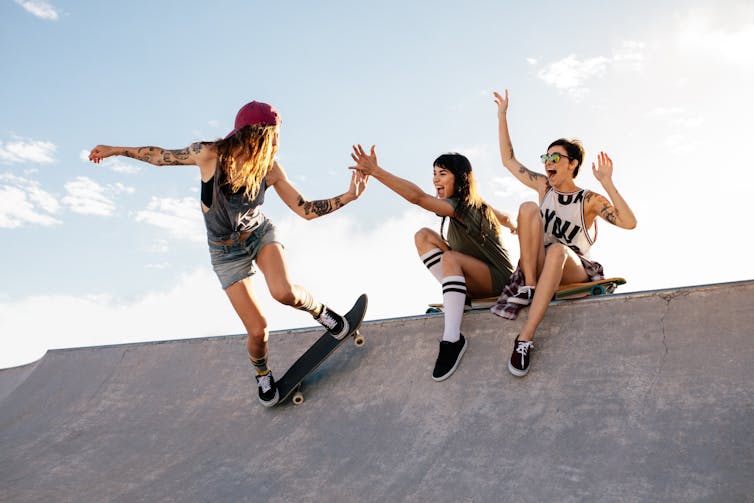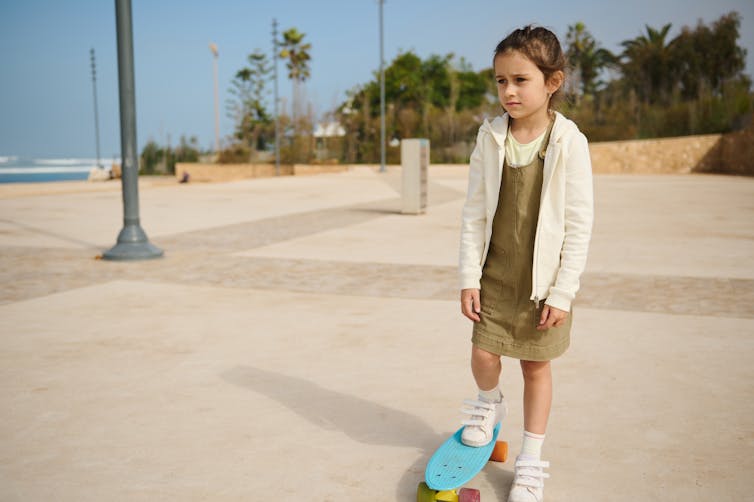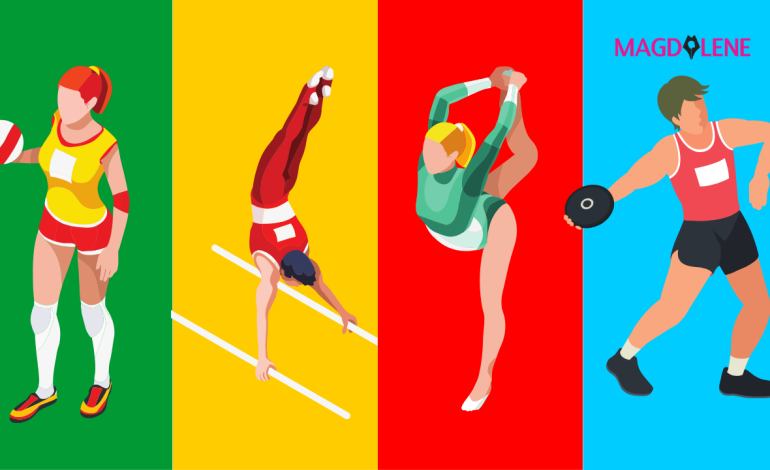Girl Skateboarders Love the Sport, But Risk Sexual Harassment

When Sky Brown won the bronze medal in women’s skateboarding at the 2020 Tokyo Olympics, she became Great Britain’s youngest ever medallist. More young women than ever are choosing to take up the sport, but are still significantly outnumbered by young men.
Brown is competing again in Paris, along with 16-year-old Lola Tambling. While Brown is based outside the UK, Tambling emerged from the grassroots UK skateboarding scene, having started skateboarding at a Cornish skatepark run by her parents.
So what’s it like to be a girl skateboarder in the UK today? To find out we conducted a 20-month study of young woman skateboarders, funded by The Leverhulme Trust. We focused on three skate parks and related skate spaces in and near to two cities, one in north-west England and the other two in the English midlands.
One skate park was partially indoors and managed, with entry charges and coaching available. The others were outdoor and open to all.
We observed and mapped activity in the skate spaces, and interviewed 32 young woman skateboarders, aged eight to 27, ranging in skill from beginner to expert. We also recorded a meeting of women organised by a local skatepark, and held a focus group after an exchange visit between two skateparks set up by us.
We also interviewed 15 others involved in local skateboarding sites and communities, including young men skateboarders and coaches. Our questions focused on the experiences of young woman skateboarders, including what they enjoyed and didn’t enjoy about the sport.
Also read: Win or Lose, Sporting Events Lead to Spikes in Domestic Violence
Overall, we found that the young women were enthusiastic about being skateboarders and most saw it as their core identity. Although some had high aspirations for their performance, they mainly talked about skateboarding as fun, enjoyable and exciting. We also found that both coaches and girl skateboarders thought that there were no gender differences in attitudes to risk and injury, despite wider community beliefs and the association of physical risk-taking with masculinity.
The young women we interviewed felt that skateboarding was good for their mental health, for several reasons. First was the focused nature of the activity and the way it provided a sense of meditative flow, followed by an explosive rush of enjoyment when they achieved something new.
Second, they spoke about the way that the process of skateboarding kept them firmly in the present: if you get distracted you fall off. This allowed them to keep intrusive thoughts at bay and provided a temporary escape from bad experiences. They also reported lower anxiety levels and a sense of achievement from having learned a set of difficult skills.
Third, young women described the social connection they gained from skateboarding, and how this had decreased their social anxiety and given them more confidence. This reflects other research into skateboarding communities, which suggests that community participation is a major mental health benefit.

Jacob Lund/Shutterstock
Our respondents particularly valued skateboarding with other women, either in girl-dominated local groups or at women and girls’ nights at managed skate parks. Some also talked about how participation helped them find an identity. Others described how being able to slot into a local skateboarding community had allowed them to move between cities, or even across continents.
Finally, skateboarding provided a physical challenge that promoted resilience in the face of failure – something which spilled beyond skateboarding into other aspects of their lives. Skateboarding is an unusual sport in that failure is expected and seen as part of learning. A run without a fall is remarked upon even in Olympic commentary.
This combination of physical and mental challenge, alongside an expectation of repeated failure, works against the wider pressures for perfection that young women encounter. It allowed them to value and celebrate their bodies for what they could do, rather than focus on perceived imperfections.
Challenges Girl Skateboarders Face
Girl skateboarders remain a minority group, however, which causes them difficulties. Girls still stand out in skateboarding spaces, which means that they feel much more observed than boys do. Because it is still assumed that young women with skateboards are “posers” rather than skaters, they have to perform immediately on arrival in order to prove themselves. Most of our respondents found this oppressive and said it could put them off skateboarding when others were around.
Some also pointed out that they were seen as having higher skill levels when dressed androgynously. Even expert skateboarders were told they were “good for a girl”, and a woman coach had been sidelined by a man during a teaching session.
Girls also found it harder to enter and participate in local skateboarding communities, usually relying on men friends for initial entry. While, once included, some young women found that local skateboarding men protected them from hassle from the public, others complained of sexual harassment in skateboarding spaces, including from other skateboarders.

Taras Grebinets/Shutterstock
And while the men we interviewed talked inclusively about young women’s participation, our skate park observations indicate that girls tend to be confined to the margins except in woman-only sessions. This suggests that this talk is not always accompanied by action. This was exacerbated by ongoing concerns from young women about “being in the way” that weren’t shared by young men.
Also read: Gender Makes a World of Difference for Safety on Public Transport
While girls are increasingly taking up skateboarding, there is still a long way to go towards full parity of participation. We recommend that skate parks be designed to be more inclusive, for example by including more flat ground space to support beginners and having some areas partially screened from public view. Inclusion can also be supported by funding to allow managed skate parks and local skateboarding groups to provide more woman and girl only sessions, if possible with coaching support.
Carrie Paechter, Nottingham Trent University and Michael Keenan, Nottingham Trent University
This article was first published on The Conversation, a global media resource that provides cutting edge ideas and people who know what they are talking about.






















